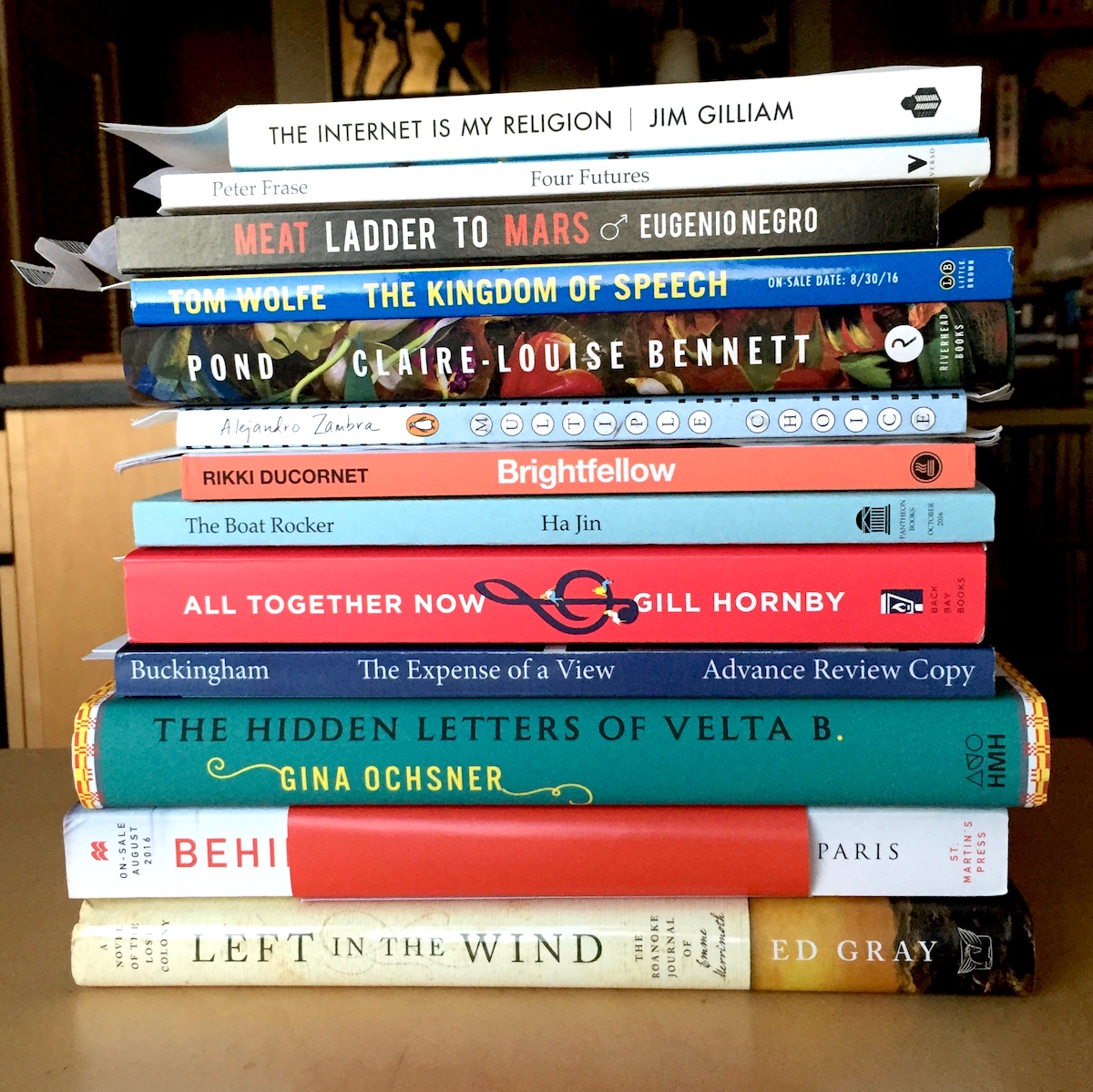The Sunday Post for July 3, 2016
5 Reasons Why Moby-Dick Just Won’t Die
Thankfully, my high school English teacher decided we’d skip the technical chapters on how to behead a whale. But Mark Beauregard explains why Melville’s Moby Dick as a whole is still relevant 165 years later.
To be an American in 2016 is to feel threatened from within and without. We have anxiety about our role in the world and our responsibilities to other Americans, which some people want to solve by electing a monomaniacal Captain Ahab (Trump) to take the helm and some people want to solve by electing a radical populist Ishmael (Sanders). The whole symbolic architecture of Moby-Dick, with its unresolved, polarized conflicts perfectly suits our moment.
Can Reading Make You Happier?
Ceridwen Dovey, like many, has felt the oppressive, heavy panic upon realizing how many books there are in this world and how little time there is to read them. This woe remains a big challenge in Susan Elderkin’s and Ella Berthoud’s project as bibliotherapists. Berthoud sent Dovey a questionnaire, asked questions about her personal life, and at last sent a “reading prescription.” They’ve also compiled a medical book with reading suggestions for all kinds of ailments.
I worked my way through the books on the list over the next couple of years, at my own pace — interspersed with my own “discoveries” — and while I am fortunate enough to have my ability to withstand terrible grief untested, thus far, some of the insights I gleaned from these books helped me through something entirely different, when, over several months, I endured acute physical pain. The insights themselves are still nebulous, as learning gained through reading fiction often is — but therein lies its power. In a secular age, I suspect that reading fiction is one of the few remaining paths to transcendence, that elusive state in which the distance between the self and the universe shrinks. Reading fiction makes me lose all sense of self, but at the same time makes me feel most uniquely myself. As Woolf, the most fervent of readers, wrote, a book “splits us into two parts as we read,” for “the state of reading consists in the complete elimination of the ego,” while promising “perpetual union” with another mind.
Is the Idea of ‘Art for Art’s Sake’ a Sign of Social Privilege?
One of the appealing aspects of art is its accessibility: anyone can paint, write, create. But maybe not, as Pankaj Mishra and Rivka Galchen suggest. Galchen points out that art takes time and time is luxury. Mishra throws in the effect of anti-intellectual governments and threats to take away funding if artists don’t prove loyal to the state.
The angriest artist-rebel of course was Wagner, who identified the comfortable opera-going philistines of the bourgeoisie as the cause of all evil. “I desire to shatter,” he declared, “the power of the mighty, of the law, and of property.” During the 1848 revolutions, Wagner was accused of setting fire to his own opera house in Dresden. Flaubert, the poet among novelists, transmuted disgust with the bourgeoisie into a monastic dedication to his austere art. Thomas Mann worked up a stern vision of the artist’s necessary isolation: “He is mistaken,” he wrote in “Tonio Kröger,” one of his many fictions about tormented composers and writers, “who believes he may pluck a single leaf from the laurel tree of art without paying for it with his life.”
This is what happens to footballers’ brains when they miss penalties
The entire Argentina — and Messi — supporting part of the population collectively cringed when he missed the penalty kick against Chile last Sunday. Shocked headlines, crying emoticons, and Lionel Messi’s announcement of his resignation filled the internet. What psychologists call the “ironic error” — doing exactly what you’re focusing on not doing — is pretty common, as Recep Gorgulu and Tim Woodman explain.
When the brain seeks to make the body perform in a particular desirable way, it relies on two processes — an operating process and a monitoring process.
The operating process is responsible for identifying all the steps that will allow us to achieve a desired outcome. If you are going to take a penalty, this would include taking the usual number of steps back, thinking of the spot where you want to hit the ball, running up, planting your non-striking foot next to the ball, and scoring where you were aiming. Simple, right?
At the same time, a monitoring process is subconsciously at work. It is like a radar sweep searching for information on what could go wrong, in this case hitting the post. Once it has identified such risks, it informs the operating process to try harder to find information that will make things go to plan so you can still score the penalty.
ELEMENTS: Fire - The Kickstarter Fund Project #26
Every week, the Seattle Review of Books backs a Kickstarter, and writes up why we picked that particular project. Read more about the project here. Suggest a project by writing to kickstarter at this domain, or by using our contact form.
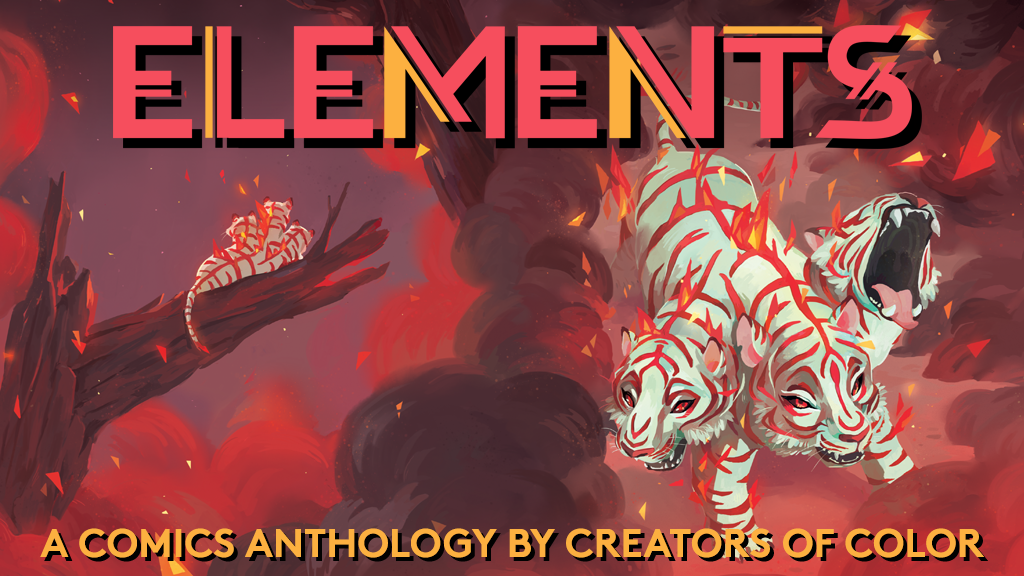
What's the project this week?
ELEMENTS: Fire. We've put $20 in as a non-reward backer
Who is the Creator?
What do they have to say about the project?
ELEMENTS: Fire - A comics anthology by creators of color
What caught your eye?
This is an awesome looking comics anthology, the second from the same group that made the Beyond Anthology, and were so successful that they're turning this into a comics publishing house.
Every creator is a person of color. They were given a theme to run with ("our fire"), and the result is this anthology that seeks to publish, and pay the creators a fair rate for their work. Beyond that, the work is done, so this Kickstarter is just to fund the printing and production.
Why should I back it?
Because you like comics, and you like that indie comics now have a way of publishing where they don't have to prove themselves to some middleman. But mostly, back it because the work looks like it will be awesome, and the first anthology won a Lammy for LGBT Fiction Anthology from the 28th Annual Lambda Awards. That means the editors, Taneka Stotts, and Shin Yin Khor, know what the hell they're doing.
Also, it's based out of Portland, so local pride!
How's the project doing?
They're 34% funded with 30 days to go. I think they'll be fine. Hop on while there's still some early bird specials to be had!
Do they have a video?
Kickstarter Fund Stats
- Projects backed: 26
- Funds pledged: $520
- Funds collected: $440
- Unsuccessful pledges: 0
- Fund balance: $520
This Electric Literature explainer presents a straightforward, warts-and-all look at the business of writing and publishing. If you ever fantasized about selling a book and retiring to the French Riviera, you should probably read it. Or not. Maybe you shouldn't read it. Just keep dreaming.
The Help Desk: Lies and arson
Every Friday, Cienna Madrid offers solutions to life’s most vexing literary problems. Do you need a book recommendation to send your worst cousin on her birthday? Is it okay to read erotica on public transit? Cienna can help. Send your questions to advice@seattlereviewofbooks.com.
Dear Cienna,
What's the best way to call out a book liar? There's this awful woman dating a friend of mine, and we're all at the same parties, and she says "Oh yes, I loved it!" anytime you ask her if she's read anything.
Have you read 2666? "Oh yes, I loved it!"
Have you read the Knausgaard? "Oh yes, I loved it!"
Have you read the Voynich manuscript? "Oh yes, I loved it!"
Have you read the secret novel tattooed on Nicolas Cage's inner thigh? "Oh yes, I loved it!”
Ugh! I wish she'd just say "No, tell me about it" or something. So, I decided next time I see her enough of this being nice shit, I'm going to call her out. You're mean and seem to not mind making people uncomfortable in public. How do I do this?
Pansy, White Center
Dear Pansy,
I think the better questions are, why do you care if someone else lies about reading books that you’ve read? How does it diminish your pleasure in having read them? If she bugs you so much, why not just avoid asking her about books — or rephrase your questions. Ask her “what are you reading right now?” or follow up with, “what did you love best about Nicolas Cage’s thigh oeuvre?”
I suspect you crave being right for its own sake, and all the better if you have an audience to witness your absolute rightness and her abject wrongness.
I can relate. This week I got into an argument with a coworker about which state has more trees in it – Idaho or Washington. The coworker said Washington, because Idaho is “mostly desert” according to her, and I said, “actually, Idaho is about 12,000 square miles larger and only the southern part of the state is high desert, much like the eastern half of Washington.” I do not like this coworker; she suspects rainbows are chemtrails that turn people gay and once accused the sun of being Mexican for giving her a tan. So when all of our coworkers and the internet agreed that she was probably right – Washington is called the Evergreen State, after all – my first thought was, “I’ll just start a few forest fires and we can resume this discussion next week.”
But being right doesn’t make you a hero and it doesn’t mean you win. Often, people just think you’re an asshole for proving how right you can be at the expense of a national forest or two.
I'd advise you not to confront this woman. However,if you absolutely cannot leave it alone because, like me, you are deeply flawed, here is what you do: the next time you’re at a crowded party and she professes love for a book you suspect she hasn’t read, point directly at her face and start screaming, “LIAR LIAR PANTS ON FIRE! LIAR LIAR, PANTS ON FIRE!” If you have a lighter handy and she is willing to stand still, attempt to light her pants on fire until someone physically restrains you. That’ll ensure she never wants to talk books with you again. Meanwhile, everyone else at the party will decide you’re a complete freak instead of a run-of-the-mill asshole, and forgive you more readily for your outburst.
Kisses,
Cienna
Gay Talese disavows upcoming book
Paul Farhi at the Washington Post writes:
In his forthcoming book, “The Voyeur’s Motel,” acclaimed journalist and nonfiction author Gay Talese chronicles the bizarre story of Gerald Foos, who allegedly spied on guests at his Colorado motel from the late 1960s to the mid-1990s.
But Talese overlooked a key fact in his book: Foos sold the motel, located in Aurora, Colo., in 1980 and didn’t reacquire it until eight years later, according to local property records. His absence from the motel raises doubt about some of the things Foos told Talese he saw — enough that the author himself now has deep reservations about the truth of some material he presents.
Talese says he's "not going to promote this book" because "its credibility is down the toilet." The Voyeur's Hotel will be published on July 12th. Talese, of course, created quite a different little shitstorm around himself in April of this year when he couldn't name any female journalists he admired.
Maybe you should send some flowers or kind emails to Grove/Atlantic, the book's publisher, because they are certainly having a wickedly bad week in the PR department right now. Whenever something like this happens with a nonfiction book of reportage, people are always shocked to discover that publishers don't fact-check books. This is never going to change; fact-checking is such an expensive and time-consuming process that publishers would have to lay out a whole lot of cash that they don't have to launch fact-checking departments.
Perhaps the most shocking part of this particular story, though, is that the New Yorker ran a preview of the Talese book in April and either nothing in the excerpt mentioned Foos's voyeurism during the 1980s or their much-vaunted fact-checking department didn't discover any of the discrepencies uncovered by the Post. If it's the latter, that's a whole new scandal.
This is a story that's going to continue for the next few weeks, and it could cause a reevaluation of the entire New Journalism movement which Talese helped create. In another case of bad timing, Talese contemporary Tom Wolfe's new book, Kingdom of Speech, is coming out at the end of August, and it might get swept into this whole Talese conversation. We'll have more as it develops.
A couple months ago, feminist humor site The Toast announced that they were closing down on July 1st. Today, it is July 1st and The Toast is, in fact, closing down. This morning, they ran a goodbye post from Hillary Clinton:
I know that today is the final day of The Toast, and I wanted to take a moment to reflect on what this space — and spaces like it — mean for women.
You should go read the whole thing. Also, take note of Clinton's author bio:
Hillary Clinton is a former First Lady, senator, and Secretary of State, and is currently running for President. She thinks your hair looks great exactly as it is.
The Portrait Gallery - Octavia Butler
Each week, Christine Marie Larsen creates a portrait of a new author for us. Have any favorites you’d love to see immortalized? Let us know
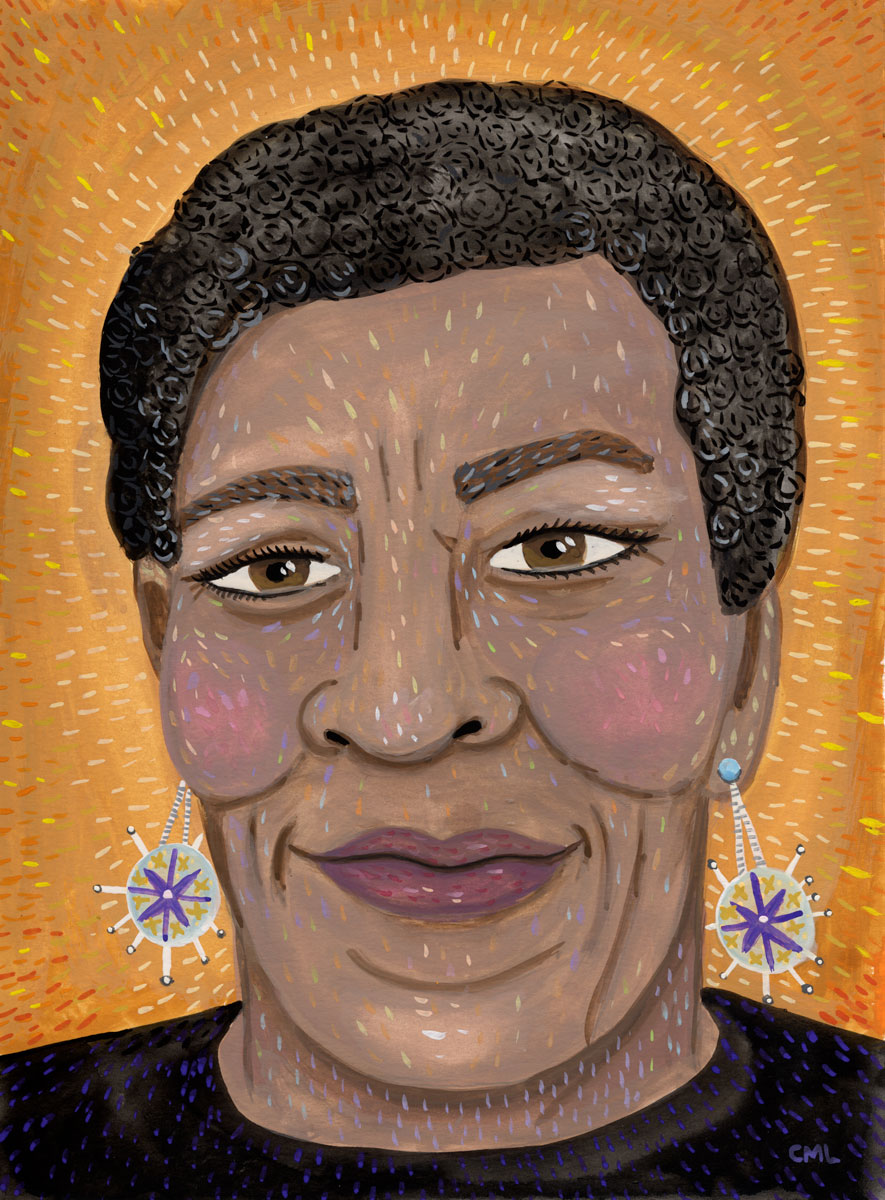
Octavia Butler would have turned 69 last week. Though she struggled to earn mainstream acceptance of her work early in her career, Butler is now considered one of the most influential and important Science Fiction writers of the late 20th century. She came up through the Clarion Workshop, where there is now a scholarship in her honor to support writers of color. From there she went on to write several novels, publishing her last book in 2005. Hailing originally from Pasadena, she found a home in the Pacific Northwest, dying in Lake Forest Park in 2006.
This Jonkers infographic, "Working Titles of Famous Novels," is an interesting study of what might have been. Would 1984 have been as popular as it has been if it retained its working title of The Last Man in Europe? I kind of doubt it. That said, some of the working titles are better: I've always preferred Atlas Shrugged's working title because it better reflects Ayn Rand's on-the-nose aesthetics. A quick internet search reveals that people have been wondering after working title what-might-have-beens for years. (Wacking Off might be a better, more appropriate title for the Philip Roth novel than Portnoy's Complaint.)
So far as I know, Seattle's most beloved librarian/action-figure-model has never even publicly talked about a desire to write fiction. According to the announcement, Pearl's debut novel, George and Lizzie, is about a married couple that has....
...radically different understandings of what love and marriage should be; he grew up in a warm and loving family in Tulsa, Oklahoma, his father an orthodontist, his mother a stay-at-home mom while she grew up as the only child of two famous psychologists who related to her more as an in-house experiment, than a child to love; it extends from their first meeting to more than a decade into their unlikely marriage...
It'll be published by Touchstone in June of 2017.
Thursday Comics Hangover: The third Panther
It's been three months since the first issue of the Ta-Nehisi Coates/Brian Stelfreeze Black Panther was published. You can tell that the series has become a runaway bestseller because it's the first monthly comic that local bookstores like University Book Store and Elliott Bay Book Company are carrying as they're released, rather than waiting for the hardcover graphic novel compilations to be published.
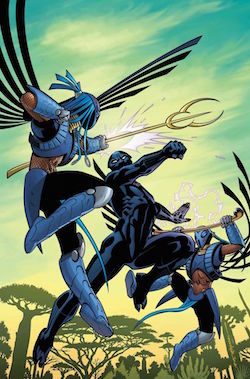
The most interesting characters in this series, though, are Aneka and Ayo, the lovers who have vowed revenge on the Panther as the Midnight Angels. They've demonstrated the most emotional range of all the characters, and they seem to have devised a complex plan to take down the Black Panther. It's quite possible that Coates is more interested in them than he is in the book's supposed protagonist, which is perfectly fine. The Panther's magisterial longing for peace and acceptance is better off in the background of his own book. The supervillains, after all, often steal the show right out from under the hero because they're allowed to want more interesting goals.
Unfortunately, the monthly schedule seems to be grinding down Stelfreeze's art. The striking layouts and refreshing chiaroscuro of the earlier issues is slowly disappearing, replaced by a much more standard superhero comics illustration. (I had to check the credits page while reading the issue because I wasn't even sure Stelfreeze drew the comic.) Only occasional scenes, such as a sequence set in a Wakandan afterlife, demonstrate the kind of verve that he brought to every page in the debut issue.
The thing about monthly comics is that they're a long haul. If a creative team cannot sustain its energy all the way through a story, the story suffers. You can't take back a book's chapter once it's already been published. For now, Coates is still demonstrating the same intellectual excitement for the material that he did in issue number one. The question is whether Stelfreeze will be able to join him across the finish line.
Book News Roundup: Diversity and white supremacy in literature
Samantha Pak at the Seattle Globalist has written a great report on diversity in Seattle's bookstore scene. It's a must-read.
Seattle cartoonist Seth Goodkind discovered that someone plagiarized his artwork in order to win a contest put on by a music festival. When confronted, the artist apologized, but Goodkind wrote a wonderful letter explaining why plagiarism and contests for "exposure" harm artists. It's publicly posted on his Facebook wall and it's worth your time to read the whole thing. A taste:
Try asking several car dealerships if they will let you drive their vehicles around for a couple of weeks, and, if you like one, you might pay them for the mileage, and in the meantime, it’ll be “great exposure.” Considered this way, spec-work is simply a way of taking an artists work for little or nothing. In essence, theft.
I recently interviewed the author Mary Roach about her wonderful book Grunt at Town Hall Seattle. If you couldn't attend, the audio of that interview is now available over at KUOW.
"It is nearly impossible to be a writer and not be complicit in white supremacy," writes Zinzi Clemmons in an essay titled "What It Means to Be an Inclusive Literary Journal" published at Literary Hub.
Don't listen to USA Today: Cormac McCarthy is still alive.
Your Week in Readings: The best literary events from June 29th - July 5th
Wednesday June 29: Know the Mother Reading
Desiree Cooper’s short story collection Know the Mother examines motherhood in all its complicated variations — mothers of unborn children, mothers of adults, unhappy mothers. Seattle author Tara Conklin’s novel The House Girl is a novel about a runaway slave’s legacy. These two should deliver a fascinating conversation about race and gender. Elliott Bay Book Company, 1521 10th Ave, 624-6600, http://elliottbaybook.com . Free. All ages. 7 p.m.Thursday June 30: So Much for That Winter Reading
See our Event of the Week column for more details. Seattle Public Library, Capitol Hill Branch, 425 Harvard Ave E., htp://spl.org. Free. All ages. 6:30 p.m.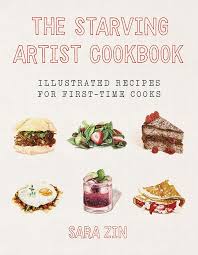
Friday July 1: The Starving Artist Cookbook Reading
Just because you’re poor doesn’t mean you have to eat garbage. Artist Sara Zin learned how to cook real food from real ingredients, and now she’s published The Starving Artist Cookbook: Illustrated Recipes for First-Time Cooks. For God’s sake, stop eating Lunchables three times a day and go listen to this woman. Elliott Bay Book Company, 1521 10th Ave, 624-6600, http://elliottbaybook.com . Free. All ages. 7 p.m.Saturday July 2: Go Read An Invisible Sign of My Own
There are no readings or literary events to speak of over 4th of July weekend, so instead I’m going to recommend three short books you can read in the span of a single day. The first one is Aimee Bender’s remarkable novel An Invisible Sign of My Own. It’s about a fragile young woman who somehow becomes a schoolteacher, even though she’s woefully unprepared to be a schoolteacher. Eventually, she meets the most adorable love interest to ever appear in fiction, and there’s a horrible accident. Will things work out? Is that even the right question to ask?Sunday July 3: Go Read an Ed McBain Novel
If your hobbies include lying on the couch and watching Law & Order reruns, you should give one of Ed McBain’s 87th Precinct novels a shot. It’s a series, but it doesn’t run in strict episode-to-episode order; you can start reading anywhere you want. The 87th Precinct books are police procedurals with razor-sharp dialogue, interesting crimes, and memorable scenes. I read three in a day, once.Monday July 4: Go Read Fup
Jim Dodge’s novella Fup is just about the perfect short read: it’s about an old man who winds up in charge of his grandson’s welfare. The two of them adopt a pet duck, who they name Fup. (Get it? Fup Duck?) The duck changes both of their lives for the better. Fup is funny and sad and optimistic and about as much fun as you can find between two covers.Tuesday July 5: Clarion West Presents Elizabeth Bear
Seattle-area sci-fi writing organization Clarion West brings Elizabeth Bear to town as part of its summer reading series. Bear has written 27 novels and over 100 short stories in the last 11 years alone—step aside, Stephen King—about an array of topics including espionage, LGBT rights, witchcraft, and steampunk brothels. University Book Store, 4326 University Way N.E., 634-3400, http://www2.bookstore.washington.edu/. Free. All ages. 7 p.m.Literary Event of the Week: How to tell a story using this one weird trick
UPDATE: Due to illness, the event celebrating author Dorthe Nors that was originally scheduled for this week has been canceled.
Headlines used to be an art form. Newspapers once hired people specifically to condense all the drama and nuance and vitality of a news story into five or six words that could grab readers at twenty paces.
Now the headline has become the domain of the social media expert, and their goals are much more modest: to divert you, however momentarily, from your Facebook news feed. Which is why every headline feels like a sleazy pick-up line: without that relentless clash between specificity and withheld information — This Weird Trick Might Make Your Life Actually Worth Living — or sheer factoid overload — 57 Rock and Roll Shows That You Have to Attend This Week, or Else Something Terrible Will Happen to You — a headline is never going to divert you from the soap opera that is your friends’ lives.
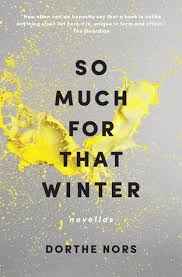
Minna sees the mothers’ group often.
The mothers’ group takes walks in Amager.
The mothers’ group drives in formation.
The mothers’ group is scared of getting fat.
The mothers’ group goes jogging with their baby buggies.
The mother’s group eats cake at the café.
The mothers’ group contends gently for the view.
The baby buggies pad the façade.
The baby buggies form a breastwork.
Minna fears the mothers’ group.
Minna cannot say that out loud.
Minna has no child.
This format can be a bit much. The uniform brevity of the lines makes the story’s staccato pace uncomfortably relentless. The other novella in Winter, titled “Days,” is the perfect antidote for readers exhausted by headline overdose. It’s a series of lists written by a woman on the verge of cracking up. Unlike the short bursts of Minna’s story, the lists in “Days” have variegated rhythms and cadences:
2. Had my last wisdom tooth extracted.
3. Had my mouth stitched up with needle and thread by a man who said I would heal slowly because my age was against me.
4. as if I didn’t know that, I thought, as if it isn’t such things that make me stop midmotion in plotting out the future, and if you’ve got something for aching of the heart, Dr. Lars, if you’ve got something for emptiness and loss of voice, if you’ve got something for time’s tooth, then be sure to add it to my bill, but otherwise I think you should hold your tongue, unless you want to hear my philosophy of teeth — would you like to hear it? Would you?
5. Didn’t get the tooth to bring home.
Though they make up the traffic of our online lives, lists and headlines have never felt so alive, so uncomfortable, so raw as they do when Nors writes them.
The ethical way to get the word out about your project
When we started the Seattle Review of Books we had two options for trying to fund our content: put ugly ads on every page, or try something experimental with a sponsorship program. There were three points that made this an easy choice:
- Ad rates are falling across the internet. Many sites need to place more and more ad slots just to make the same amount of money they used to.
- The ads are gross. They track you from website to website, and the publisher has no control over what pictures or message they carry. Can you imagine a print magazine with no control of what ads are published? We didn't want to expose our readers to this.
- Ads put downward pressure on editors to create clickbait headlines and sensational posts in hopes of going viral, because going viral means a payday. It homogenizes content, encourages hopping on popular bandwagons, and undervalues taking unpopular stands because they won't pay.
But we're not trying to reach millions of people with this website. We're trying to reach a self-selecting passionate readership, who is interested every day in what we do.
Last year, Martin ran a Kickstarter, and during that time he was looking for inexpensive ways to reach book lovers to advertise what he was doing. The big networks were too expensive, the buy-in to even the smaller ad networks was beyond his means. That's why, on some book websites, all you see is the same book advertising from major publishing houses that you see in magazines.
But what about the indies? Surely the internet should be excelling at helping small publishers, self-published authors, and local event venues a place to talk about their products. But no, there was really very little out there.
So we started our sponsorship program. It has a few key metrics:
- One sponsor buys out the entire site for a week.
- We run a full chapter, or a few poems, or spreads of the book in question, so readers can fairly and accurately see if they're interested in the book without having to wade through yards of marketing.
- We clearly denote what is sponsored content and what is editorial content, and any book that is a sponsorship is ineligible to be considered for review.
So how's the program going? We sold out our full year, save for a few reserved weeks. We couldn't be more thrilled about it, and measuring our response in time-on-page shows us that you are clicking on the sponsorship and giving each sponsor a chance. That's all we ask. Give each sponsor a shot. Don't like it? No big deal. If you do, pick up a copy of the book, or go to the event, and tell them where you saw it.
We've just released our next block of sponsorships — through January 2016. Take a look, and if you have a book to advertise, try a week. It's inexpensive, effective, and helps get your work out into the world. If you're an indie writer, or have an event coming up you want to get the word out about, give us a try. We'd love to show you what we're doing to make ads on the internet something we're proud to run.
The poet next door
Published June 28, 2016, at 12:57pm
Three new books from Seattle poets have absolutely nothing in common — or do they?
The visible women
Published June 28, 2016, at 10:58am
A new zine from Shout Your Abortion offers gratitude and celebration for an invisible subset of everyday hero: abortion providers.
Bruise: A Study
Bruise: A Study
I.
The bruise begs
in purple tones
for you to think
with your tongue,
for you to listen
with your hands
to the tremulous
voice of my skin.II.
I:
pressed it into my skin, ran into the corner of the counter on my way to make dinner, opened a door in to my shin, let you too close, slammed my finger in the car door, dropped a book on my toe, pushed the baby on the swing and didn’t watch her swing back, had surgery, pinched myself over and over like a pulse, slammed my head against a wall, ignored the warning signs, fell down stairs, fell into you, fell away from you when you pushed, found myself under something heavy.
III.
Run your fingers along it. Here.
Feel the heat radiating?
One way to say it is:
I want my pain to warm you.
Which is close to:
I want my pain to warn you.
The fist-sized knot of color
throbs with my heartbeat
if I lie very still and don’t breathe.
I wonder if I might read bruises
like wood-grain or tea leaves.
I wonder if I would believe it.IV.
Don’t view it from the corner of your eye. Look at it straight on. Not through glass or in reflection, but eye to blue-blushed and broken skin with only air between. Not with the intention of recording in paint or word, but only to see the way it fades in the direction blood flows. Watch the edgesshiftas healing requires. It won’t be the same again. No matter how well it heals.
V.
Like nausea it recedes
into green and yellow,
hints of death and then
renewal. But this isn’t
resurrection.
This isn’t a miracle.This isn’t a returning to.It is something changed.
Something marked by pain.
This flesh regains the ability
to blush and pale and blush again —
but the nerves and muscle know
what has been.VI.
The wound heals before the colors fade,
the body wants you to remember its work:
hemoglobin produces a red-blue color,
the wine spilled across the carpet;
biliverdin pushes green to the surface,
too easy to say the hint of spring (instead: bile);
bilirubin brings
the color and cry of jaundiced babies;
hemosiderin with its golden-brown,
barely distinguishable now from flesh,
except in the right light
where the shadows fall like memories.
A rare Seattle visit from bestselling British suspense novelist
Sponsor SJ Watson is coming to Seattle! You probably know him from his thriller Before I Go to Sleep, which was made into a major motion picture by Rowan Joffee, starrting Nicole Kidman and Colin Firth. His latest book Second Life is out in paperback.
He's going to be at University Book Store in conversation with local writer Sonya Lea. If for some reason, you're unfamiliar with his work, a good place to start is our sponsors page, which has the entire first chapter from Second Life.
It's thanks to sponsors like SJ Watson, and readers like you, that we're able to keep the pixels lit up here at the Seattle Review of Books. We've just released our next block of sponsorship opportunities. Check them out on the sponsors page, and grab your date before they're gone.
Interview with our new Public Diversity Editor
We're thrilled to announce that our new Public Diversity Editor is (drum roll!): Vannessa Willoughby. Vanessa will be checking in with us twice a year or so, and reporting back on what we've done well, and where we can improve, in terms of diversity. If her name sounds familiar to you, perhaps it's because you've read her work at The Toast, Bitch Media, Vice, or The Establishment (just to name a few). You can find out more at her own website, or follow her on Twitter.
Thanks to Vanessa for bravely tackling this role, and, as far as we can tell, becoming the first Public Diversity Editor of any publication in the history of publishing.
First off, thank you for taking this role on. Can you tell our readers something about yourself?
I’ve been an avid reader and writer has far back as I can remember. People always ask, “Did you always know that you wanted to be a writer?” It’s always been something that I’ve aspired to, but I don’t think I really took it seriously until high school. I attended Emerson College for my undergraduate degree, which certainly cemented my career goals. Following Emerson, I attended The New School for my MFA. While at The New School, I was able to expand upon my craft and really devote myself to improving as a writer. In addition to freelance writing, I’m the Creative Director at Winter Tangerine and the Promotions Manager at Apogee Journal.
What interested you in the role of Public Diversity Editor?
I think that accountability is important. The conversation concerning diversity in literature and literary institutions can be frustrating, due to the fact that for all the talk, progress can feel slow. Lack of diversity in both what’s being published and the gatekeepers making these decisions isn’t on account of silence. In the past few years, the need for diversity has been vocalized and discussed in increasingly public spaces. But how do we implement these changes if no one is actually acting on them? I think it’s admirable that the Seattle Review of Books not only recognizes the need for diversity, but the fact that the team is making tangible steps to achieve it. Although my identity is not solely limited to my race and ethnic heritage, it’s an important, undeniable part of me. As a writer and as someone who has been given the power attached to an editorial role, I want to be able to open doors and break down barriers.
What are some of the signals you'll be looking for in our work that tell you where we've succeeded, and where we need to improve?
I’ll be looking for the variety in content and the creators of the content. The success of implementing diversity shouldn’t be limited to the books that are covered, but the voices of the contributing staff. When we speak of diversity, it also doesn’t necessarily mean just race. It also calls into mind diversity in gender and sexual orientation. Asking for underrepresented voices isn’t always enough. Is a publication making visible efforts to reach out to these people? Whether it be by holding special open-calls, lowering submission fees, partnering with underrepresented groups or institutions? Being aware of a lack of diversity is a baby step, not endgame.
Are there any organizations that you think are doing especially well with diversity, that other organizations should be looking to for examples?
An obvious choice would be VIDA. I also think that Nat. Brut does a good job, Muzzle Magazine, and As/Us. Also, even though I’m on staff for these two, I do think that Winter Tangerine and Apogee consistently make conscious efforts to uphold diversity in their submissions and staff. I also like the mission of The James Franco Review, which only accepts blind submissions in order to combat literary nepotism or favoritism.
